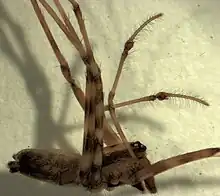Nanocambridgea
Nanocambridgea is a monotypic genus of intertidal spiders containing the single species, Nanocambridgea gracilipes. It was first described by Raymond Robert Forster & C. L. Wilton in 1973,[2] and is found on New Zealand.[1] Originally placed with the Stiphidiidae,[2] it was moved to the Desidae after a 2017 genetic study.[3] A male described as N. grandis in 2000[4] was synonymized with Cambridgea reinga in 2011.[5]
| Nanocambridgea | |
|---|---|
 | |
| N. gracilipes, male | |
| Scientific classification | |
| Domain: | Eukaryota |
| Kingdom: | Animalia |
| Phylum: | Arthropoda |
| Subphylum: | Chelicerata |
| Class: | Arachnida |
| Order: | Araneae |
| Infraorder: | Araneomorphae |
| Family: | Desidae |
| Genus: | Nanocambridgea Forster & Wilton, 1973[1] |
| Species: | N. gracilipes |
| Binomial name | |
| Nanocambridgea gracilipes Forster & Wilton, 1973 | |
See also
References
- "Gen. Nanocambridgea Forster & Wilton, 1973". World Spider Catalog Version 20.0. Natural History Museum Bern. 2019. doi:10.24436/2. Retrieved 2019-10-13.
- Forster, R. R.; Wilton, C. L. (1973). "The spiders of New Zealand. Part IV". Otago Museum Bulletin. 4: 1–309.
- Wheeler, W. C.; et al. (2017). "The spider tree of life: phylogeny of Araneae based on target-gene analyses from an extensive taxon sampling". Cladistics. 33 (6): 606. doi:10.1111/cla.12182. S2CID 35535038.
- Blest, A. D.; Vink, C. (2000). "New Zealand spiders: Stiphidiidae". Records of the Canterbury Museum. 13 (Suppl): 21.
- Vink, C.; et al. (2011). "Reuniting males and females: redescriptions of Nuisiana arboris (Marples 1959) and Cambridgea reinga Forster & Wilton 1973 (Araneae: Desidae, Stiphidiidae)". Zootaxa. 2739: 45. doi:10.11646/zootaxa.2739.1.4.
This article is issued from Wikipedia. The text is licensed under Creative Commons - Attribution - Sharealike. Additional terms may apply for the media files.